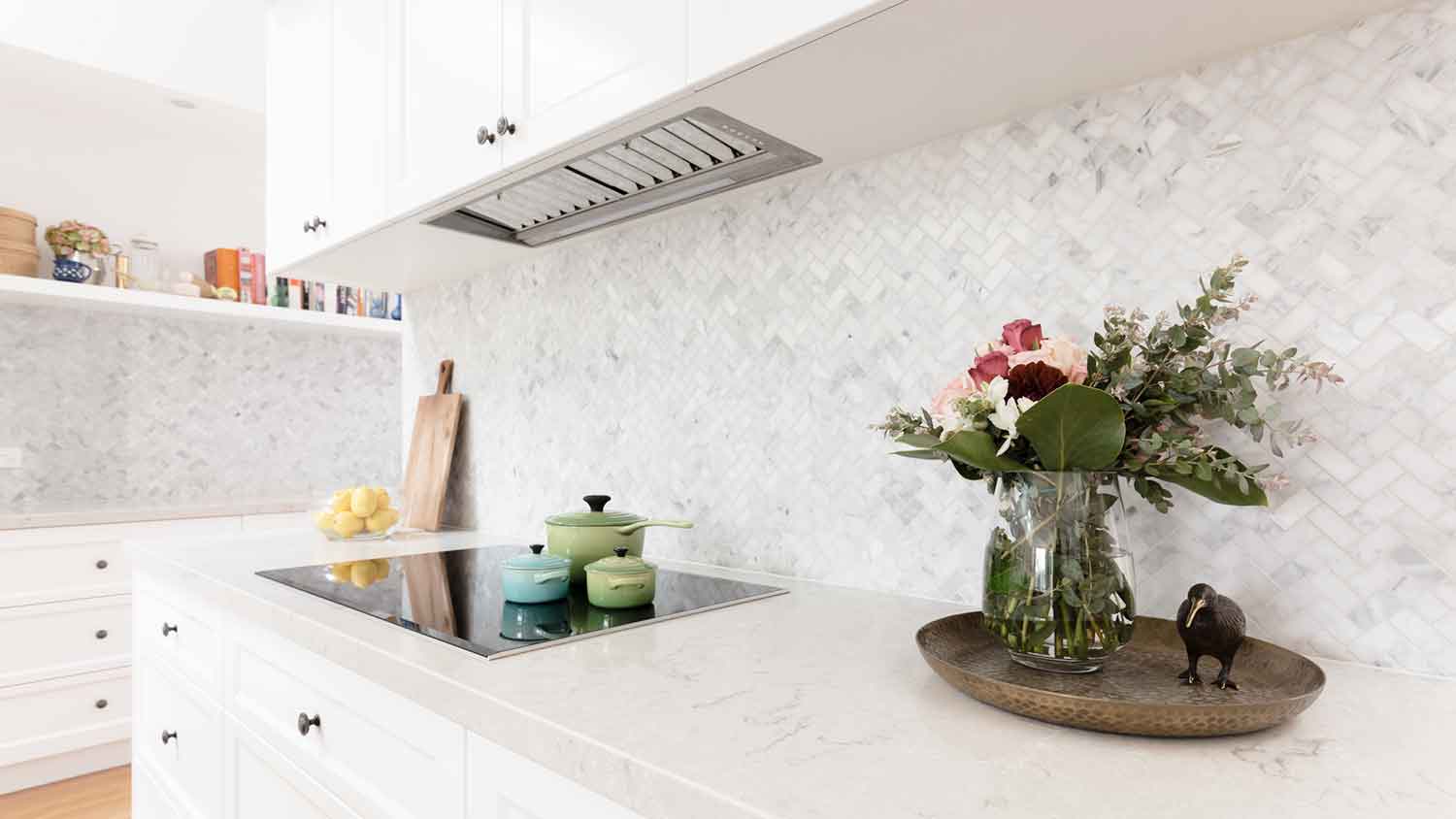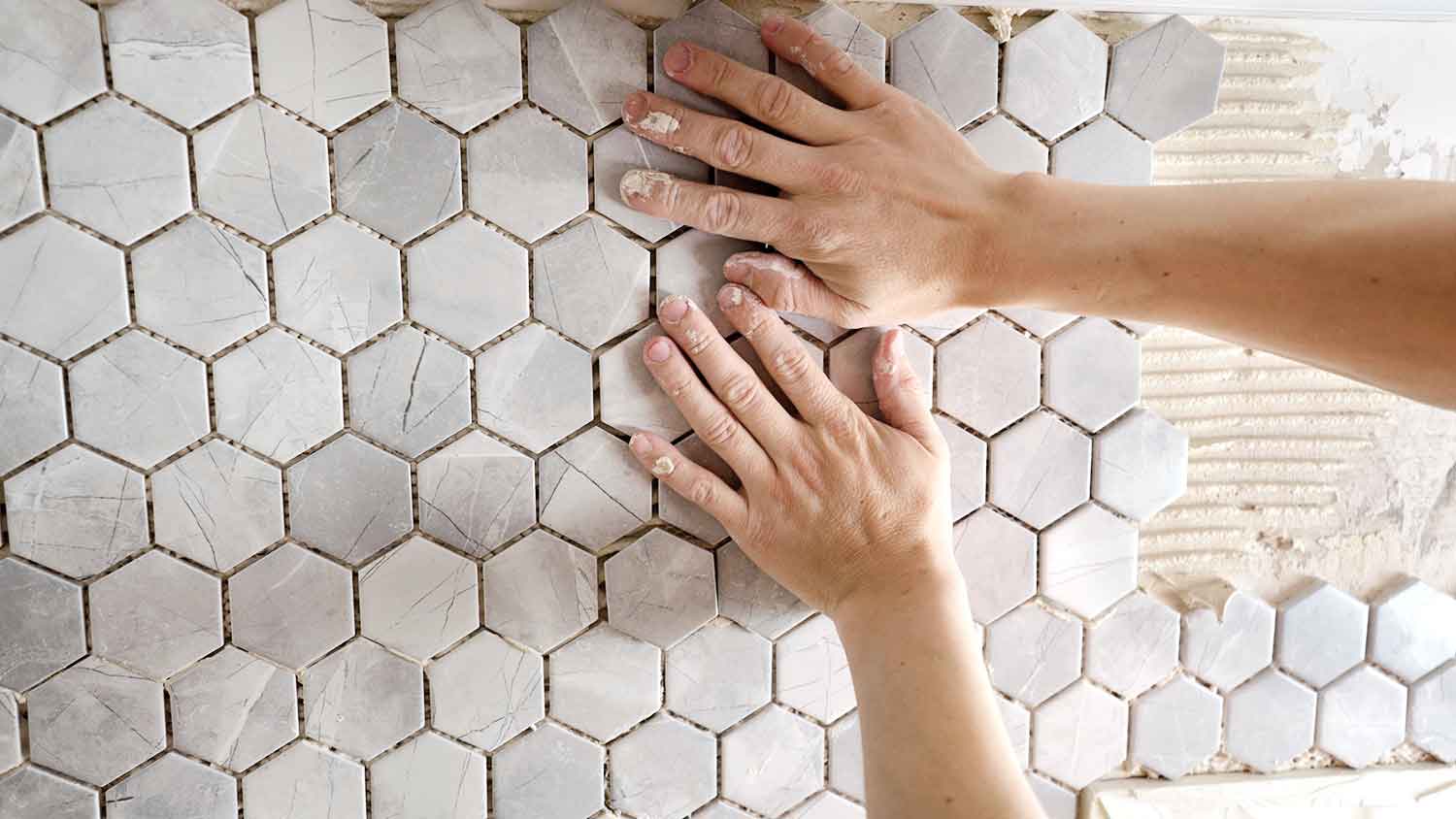
The cost to install porcelain tile depends on materials, size, and whether you DIY or hire a pro. This guide will help you choose the perfect porcelain tile for your home and budget.
They may be tiny, but they make a big design impact


Mosaic tile comes in a wide variety of shapes, sizes, and textures.
It’s popular in bathrooms and kitchens as well as on fireplaces.
It comes on mesh-backed sheets, but installation is challenging.
If you're looking for a way to make your home feel more sophisticated or artsy, mosaic tile is one of the simplest ways to achieve your goals. Exactly what is mosaic tile, and is it right for your home? Keep reading to learn about this popular design choice.
Mosaic is an ancient form of art that utilizes small pieces of tile, stone, glass, and the like. But today, when people talk about mosaic tile, they are usually referring to tiles that are smaller than 2-by-2-inches each and are arranged together. The tiles come in various shapes, including round, square, and hexagon, and they are usually sold as sheets with mesh backing to make installation a little easier.
Mosaic tiles are often used to create a pattern such as chevron, herringbone, or arabesque. Or, a homeowner might choose tiles that are slightly different shades of the same color to create a variegated effect. If you’ve been following the latest bathroom tile trends, you’ll know that mosaic tile showers have become popular. So have mosaic flooring, kitchen backsplashes, and fireplaces.

Whether you're looking for floor, kitchen, or shower tile ideas, there are numerous options for mosaic tiles that will help you get the look you want.
Glass continues to be one of the more popular types of mosaic tile. You can choose from a variety of finishes, including mirrored, transparent, and opaque.
Glass tiles reflect the light in the room, and some finishes create a shimmery effect.
Ceramic tiles are made of natural clay and topped with a protective glaze. This makes the tiles resistant to moisture and stains.
Because it is so durable, ceramic is often considered the best tile for a bathroom floor, which sees a lot of foot traffic and splashing water. Homeowners also love ceramic tiles because they come in a wide range of textures and shapes.
For a timeless, high-end look, you can’t go wrong with natural stone mosaic tile such as granite, marble, or slate. Natural stone tiles may increase your tile installation cost because they typically cost more than other tile types. But they’re a great way to add texture, and they blend seamlessly with nearly any decor.
Porcelain is one of the sturdiest options for mosaic flooring, backsplashes, and showers. It consists of feldspar, quartz, and clay. It's even sturdier than ceramic because it's fired at a much higher temperature, making it a great option for areas that get a lot of use.
Mosaic tiles have more grout lines than larger tiles—and those grout lines will collect spills, dirt, and debris if you don’t clean your tile regularly. Be sure to wipe up any spills immediately, and in addition to routine vacuuming, sweeping, or mopping, you’ll want to deep clean the tile grout periodically. If you have cement grout, it will benefit from resealing every couple of years; this helps protect the grout from stains, odors, and mold growth.
Even with regular upkeep, some areas of your mosaic tile may eventually need to be regrouted—especially if they get a lot of foot traffic. It’s worth learning how to regrout tile to keep your mosaic tile looking its best.

Understanding the good and bad sides of mosaic tile can help you determine if it’s the right choice for your home.
Many Design Options. Whether you want a bold, unique look or something soothing and organic, the options are endless when it comes to mosaic tile.
Durable. Mosaic tiles are made of strong materials and can withstand a lot of use or heavy traffic.
Less Slippery. More grout lines means more traction, so mosaic tile can be a smart choice in a slippery area such as a bathroom or mudroom. Choosing textured tiles will give you even more traction.
Challenging Installation. Lining up individual sheets of mosaic tile is a tedious and often frustrating task. Plus, because mosaic tiles tend to be thin, they are less forgiving when installed on a subfloor that’s not perfectly level. For this reason, DIY mosaic tile installation isn't suitable for most people. Finding a professional tile installer near you is best to ensure they are correctly installed.
From average costs to expert advice, get all the answers you need to get your job done.

The cost to install porcelain tile depends on materials, size, and whether you DIY or hire a pro. This guide will help you choose the perfect porcelain tile for your home and budget.

You're planning a bathroom remodel, but how much will it cost to retile your bathroom? Read this guide to find out.

Tile varies dramatically in price, but there’s something for every budget. This guide will help you plan for tile installation costs, no matter the project.

Find out what happens if you grout tile too soon and learn tips to avoid this costly mistake in this guide.

Working on a home reno? You’ll need to remove old grout and clean grout haze on newly installed tiles. Learn how to soften grout for removal in five easy ways.

Whether your floor has a small crack or some serious damage, this guide will help you know when you can make repairs or if you need a full tile floor replacement.